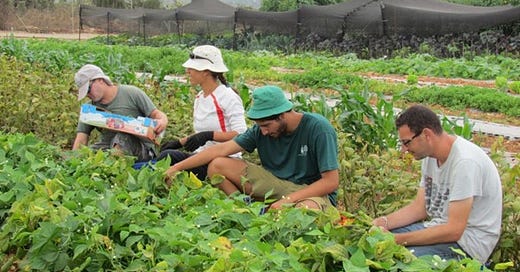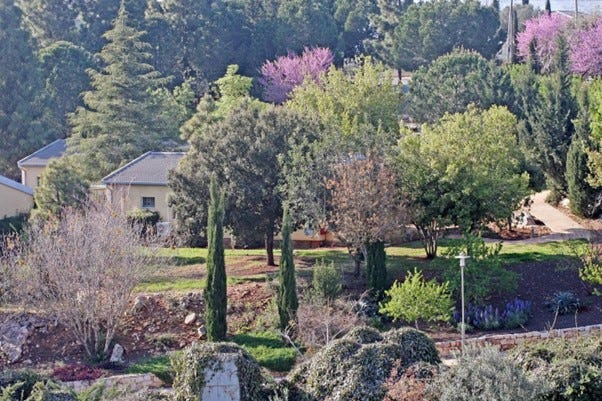Blog 116 - Kishorit
Many of my readers will know that our son James normally lives on a kibbutz in Northern Israel. James, though fully functioning, is leaning disabled. The Kibbutz is Kishorit (www.kishorit.org.il) an extraordinary kibbutz for people like James who have special needs.
In Blog 115 – “From The River to the Sea” I wrote of the war between Israel and Hamas. That war spills over to Israel’s northern border with Lebanon where Hezbollah, another arm of Iran, has attacked Israel enough to force the evacuation of Israel’s immediate border communities but not (yet) enough to cause all-out war.
Kishorit is just ten miles from the border with Lebanon.
This morning I received from Kishorit an e mail that I think is worth sharing. It comes from Shuki Leavinger, the Director of Kishorit who writes:
Dear Simon,
I reach out to you in these challenging times with an update on our beloved community. In the face of growing uncertainties, particularly with the evolving situation in the North, our commitment and dedication to our mission remain unwavering.
Amidst these turbulent times, we have received support and recognition from Herbert Krosney, a long-term supporter of Kishorit and a celebrated documentarian and author. His recent article, published on Forbes Online www.forbes.com , eloquently captures the experience of our community during this period of conflict. It highlights the life of adults with special needs in times of war and the resilience and strength of communities like ours …….
I think that my readers may find the article worth reading.
My wife and I were there at the celebration on 28th September. Our son James is first on the right in thes picture of members working in the fields of Kishorit.
Wites Herbert Krosney:
Last summer I spoke at an event in New York for Kishorit, a kibbutz for adults with special needs located in northern Israel, not far from Lebanon, a benighted country under the thumb of Hezbollah. What makes this community unique is the pioneering and successful ways it works with its members, enabling them to become productive people who perform all sorts of tasks, such as working in the kibbutz’s winery or its goat-milk operation. It is a model for the rest of the world.
This inspiring guest piece describes how this gem is finding ways to continue serving its vulnerable members despite challenges created by war.
Members working in the fields at Kishorit.
Just a few short months ago, on September 28, 2023 some 1,000 people gathered on a Galilee hill for a 25th anniversary party. The celebration was for Kishorit, an extraordinary special-needs community of some 190 dependents, a place that local officials sometimes refer to as “the Rose of the Galilee.”
The president of Israel, Itzhak Herzog, sent a video message to the assembled crowd as the sun was setting on the Galilee hills. “This community is close to our hearts and souls…. Seeing people live vibrant productive lives is like seeing a dream come true, in color, in 3D, in joy, in diversity ... creating a place in the community for people with special needs. "
Nine days later, in the early morning of October 7—the day known in Israel as the Black Sabbath—Hamas attacked in southern Israel. Rockets crashed on Israeli kibbutzim, farms, schools and an all-night dance party at which a few thousand had assembled. The Hamas invaders wantonly butchered over 1,200 Israelis and took more than 200 hostages from some 23 communities. The killing and barbarism shook Israel to its core.
“For us, the world turned upside down,” said Shuki Levinger, the astute 64-year-old social worker, who is Kishorit’s director. “Our community faces unique challenges at a time of war.”
Levinger ordered an immediate review of needed measures.” Our special-needs community is unique,” he explains, “with some residents suffering from schizophrenia, others from autism, others with problematic physical or mental dependencies, sometimes from birth or from accidents during their early years of life. We had to examine every facet of our own community and determine ways to protect it or improve those measures already in place.”
Kishorit is located only ten miles from Israel’s northern border with Lebanon, where another hostile force, Hezbollah, threatens Israel with rockets and well-armed terrorist commandos. During more peaceful times, Kishorit, nestled in the rolling hills of northern Israel, is a kibbutz like no other. Adult Jewish residents live and thrive under the care and support of Jewish and Arab Israeli caregivers, social workers and medical professionals.
Workplaces for members include a fully equipped winery, producing highly regarded Kishor wine; a plastics factory; a kennel for raising specially bred Schnauzer dogs; a dairy; and a farm, growing a range of organic produce.
The events of October 7 and the ongoing regional conflict have brought unprecedented challenges to this serene enclave, especially for its members with cognitive disabilities.
“We immediately saw that our shelters were too widely spaced apart and that we needed to build more shelters, especially in outlying areas to make sure that our members could reach safety as quickly as possible,” Shuki Levinger elaborates. "We needed to make sure that all our members had a feeling of security, that they knew they would be safe."
For those with autism, the kibbutz's structured and nurturing environment is crucial. Dani, a 30-year-old with autism living in Kishorit, embodies the deep emotional impact of the community's challenges. When sirens recently loudly blared, Dani's world was engulfed in confusion and fear, and he began to shout uncontrollably. Social workers gently guided him to a shelter.
In a situation where every second counts, the standard 30-second window to reach the safety of a shelter is an unrealistic expectation for Dani and many other residents. Yet any delay is fraught with danger. "It's a question of having the right staff in the right place and having a shelter available as close as is practically possible to where our members live and work,” Levinger explains.
Those residents with schizophrenia also face heightened challenges. The kibbutz's orderly rhythm during times of peace is shattered, threatening their sense of reality. "Ours is a vulnerable population," says Levinger, "and it's essential that we maintain a protective and nurturing environment as best we can."
Part of that job of assuring security lies with Kishorit's able staff and up-to-date equipment. One of the urgent needs is for active generators in the below-ground shelters or for one huge generator that can cover for members if electricity fails. The additional shelters need to be easily accessible and equipped comfortably enough to give residents a sense of security during times of crisis.
In this war situation the role of Kishorit’s Arab Israeli caregivers has become even more vital. About half of Kishorit’s staff come from nearby Arab communities, and a number live onsite at the kibbutz. Levinger is especially attentive to their needs and appreciative of their service. “They hold a special position in our community," he says, "for they are not just staff but are integral members of our community."
The "Rose of the Galilee.
The Galilee is an area of Israel inhabited and shared by both Jews and Arab Israelis. There is ongoing practical and positive cooperation between communities that has increased considerably in recent years. A dramatic innovation is the planned establishment of Al Fanara (“Lighthouse” in Arabic), a new section of Kishorit designed for Arab Israelis. “We want to expand, providing culturally sensitive care and services to Arab Israeli residents, while promoting shared experiences and integration with the Jewish members of Kishorit."
Kishorit has already established itself as an extraordinary social welfare community that offers residents a chance for a productive life. But in times of war, the challenges multiply. "During the last 25 years we've been able to establish a vibrant, viable community," concludes Levinger. "Up to now, we've been able to think out of the box and find solutions for our members. Now we've got to learn how to survive—and even thrive—no matter the political or military dangers. We need all the support we can get."
—Herbert Krosney, a television documentarian and author, whose latest book is The Lost Gospel: The Quest for the Gospel of Judas Iscariot (National Geographic)
To find out more about Kishorit, visit its website: www.kishorit.org.il.
To find the article on line go to





